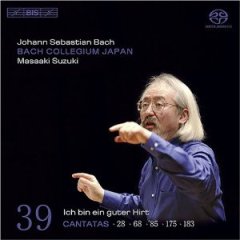Bach – Cantatas Vol.39 (Suzuki)
Bach – Cantatas Vol.39 (Suzuki)

01 – 05. Also hat Gott die Welt geliebt, BWV 68 06 – 12. Er rufet seinen Schafen mit Namen, BWV 175 13 – 18. Gottlob! Nun geht das Jahr zu Ende, BWV 28 19 – 23. Sie werned euch in den Bann tun, BWV 183 24 – 29. Ich bin ein guter Hirt, BWV 85 Peter Kooy (Bass), Carolyn Sampson (Soprano), Gerd Türk (Tenor), Robin Blaze (Countertenor), Dmitry Badiarov (Cello) Concerto Palatino Bach Collegium Japan Masaaki Suzuki – conductor
We now reach Volume 39 of the Suzuki series, and quite frankly the whole thing is almost beyond reviewing; anyone who is collecting these issues is not likely to stop now, even in the event of a bad review (which this one is not), and everything positive and good and wonderful that has been said about them before propagates into this current release. Out of the three ongoing series (Suzuki, Koopman, and Gardiner), I still think I prefer the latter’s way with the music the most, as there is a certain freshness and seat-of-your pants feeling in his live readings in different locales (and of course, he is only dealing with the church cantatas), but Suzuki brings a spiritual element that many conductors and ensembles are actually afraid to touch. Every line, every chord has been very carefully studied and rendered in the best manner possible. I’ll just say it about the Koopman—the whole series leaves me cold and flat, devoid of any sort of spiritual nourishment, and after collecting the first 10 volumes, I chucked them all.
All of the works on this disc date from 1725, and four of them are from the period of Bach’s yearlong chorale cantata cycle he had begun in 1724, and suddenly stopped work on right before Easter of the next year. The weekly Sunday service at the St. Thomas or St. Nicholas churches was a huge deal, requiring a lot of music for a four-hour long session that began at seven in the morning. Bach returned to an older type of cantata that takes the gospel reading of the day for its base.
Three of the pieces here, For God So Loved the World (BWV 68), He Calleth His Own Sheep by Name (BWV 175), and They Shall Put You out of the Synagogues (BWV 183), Bach used the services of one Christiane Mariane von Ziegler, a Leipzig poetess of some renown, who ended up providing him with the texts for nine cantatas. She felt considerably free in her attempts to work the cantata texts in the most reliable and flexible manner possible, and Bach himself freely borrowed from his own sources in other compositions, such as the inclusion of a melody from his BWV 208 “Hunt Cantata” in the aria “My faithful heart” in BWV 68, one of the most beautiful he ever penned.
Praise God, Now the Year Draws to a Close (BWV 28) has a title that has always seemed to me fairly ironic and not a little humorous in its possible double meaning. But the texts by theologian Erdmann Neumeister ignore the gospel completely on this Sunday after Christmas, instead focusing on the coming change of year, with prayers and hopes for a better future while being grateful to God for what has just passed. I Am the Good Shepherd was written for Misericordias Domini Sunday in 1725. It is full of reflections not only of Jesus as the “Good Shepherd” but also of the death that he will suffer on behalf of the sheep. Notable in this cantata is the use of the violoncello da spalla (“shoulder cello”), an instrument held not unlike a guitar (only higher on the right shoulder), and tuned as a regular cello with the possibility of a fifth and higher string. It was designed to enable the player to perform in a more virtuosic manner, and Bach himself may have held a design role in the instrument.
As mentioned before, this series is beyond reviewing, and as standards are upheld here (and great surround sound as well), I see no reason to dissuade anyone from continuing to collect. --- Steven E. Ritter, arkivmusic.com
download: uploaded ziddu 4shared divshare depositfiles








